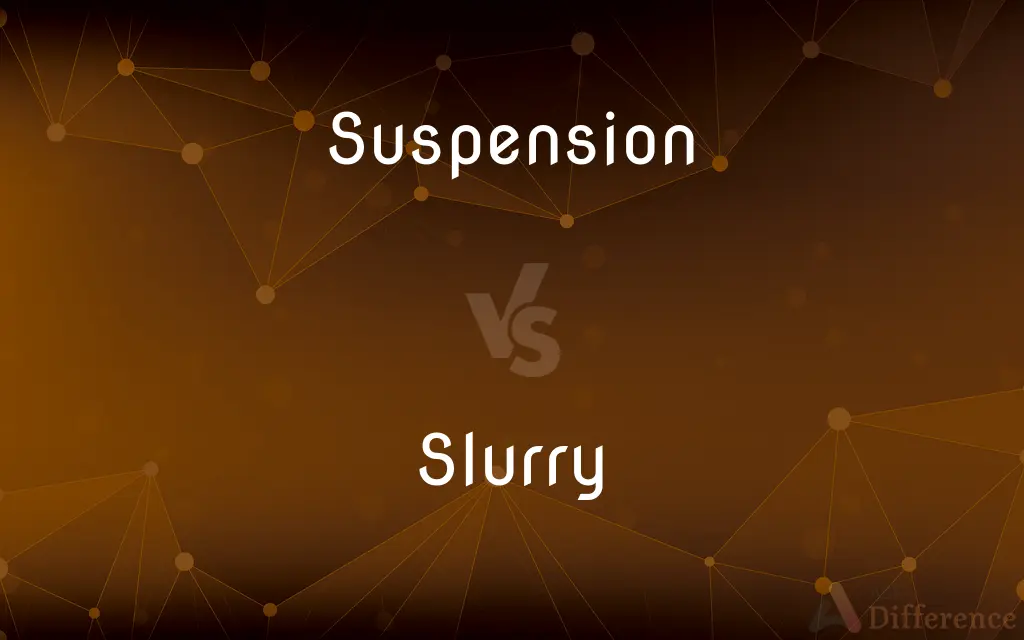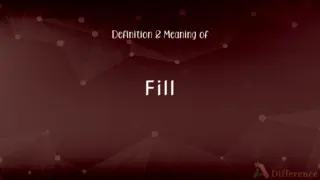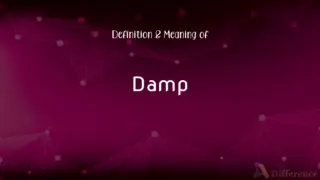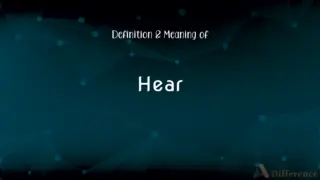Suspension vs. Slurry — What's the Difference?
By Urooj Arif & Fiza Rafique — Updated on March 11, 2024
Suspension and slurry are mixtures in which particles are dispersed in a liquid, but they differ mainly in particle size and stability.

Difference Between Suspension and Slurry
Table of Contents
ADVERTISEMENT
Key Differences
Suspension involves larger particles that do not dissolve and will eventually settle, while slurry consists of finer particles that are more stable and less likely to settle quickly.
Suspensions are typically heterogeneous, with particles visible to the naked eye, whereas slurries can appear more homogeneous due to the smaller size of the particles.
In a suspension, the particles are suspended temporarily and can be separated by filtration, whereas in a slurry, the particles are finer and can remain suspended for a longer period, making separation more challenging.
The viscosity of a slurry can be higher than that of a suspension due to the finer particles and possible interactions between them.
Suspensions are commonly found in pharmaceuticals and paints, while slurries are used in construction, ceramics, and wastewater treatment.
ADVERTISEMENT
Comparison Chart
Particle Size
Larger, visible to the naked eye
Finer, may not be easily visible
Stability
Particles settle over time, less stable
Particles remain suspended longer, more stable
Separation
Can be separated by filtration
More challenging to separate due to finer particles
Viscosity
Generally lower
Can be higher due to finer particles
Common Applications
Pharmaceuticals, paints
Construction, ceramics, wastewater treatment
Compare with Definitions
Suspension
A heterogeneous mixture with larger particles that eventually settle.
Sand in water is a suspension because the sand particles will settle over time.
Slurry
A mixture of fine particles suspended in a liquid, more stable than suspensions.
Cement mixed with water forms a slurry used in construction.
Suspension
Common in everyday products like medicines and paints.
Some cough syrups are suspensions containing active ingredients in liquid.
Slurry
Essential in industries like mining and wastewater treatment.
In mining, a slurry of crushed ore and water is used for extraction.
Suspension
Can be separated by simple filtration.
Passing a fruit juice suspension through a sieve removes the pulp.
Slurry
Requires more specific methods for separation, like centrifugation.
Separating the components of a clay slurry involves complex processes.
Suspension
Particles are temporarily suspended and may float or sink.
Flour in water forms a suspension that will separate over time.
Slurry
Particles are so fine they may not settle quickly.
A slurry of ceramic powder in water is used in mold casting.
Suspension
It has visible particles when left undisturbed.
A muddy puddle contains a suspension of soil particles.
Slurry
Often has a higher viscosity due to the interaction of particles.
The slurry in paper manufacturing is thick and viscous.
Suspension
An interruption or temporary cessation, as of an activity or of the application of a rule or law.
Slurry
A slurry is a mixture of solids denser than water suspended in liquid, usually water. The most common use of slurry is as a means of transporting solids, the liquid being a carrier that is pumped on a device such as a centrifugal pump.
Suspension
A temporary prohibition or exclusion, as from attending school or enjoying a privilege, especially as a punishment.
Slurry
A semi-liquid mixture, typically of fine particles of manure, cement, or coal suspended in water
A slurry of ore and water
Clay slurry
Suspension
A postponement, as of a judgment, opinion, or decision.
Slurry
A thin mixture of a liquid, especially water, and any of several finely divided substances, such as cement, plaster of Paris, or clay particles.
Suspension
The prolongation of one or more tones of a chord into a following chord to create a temporary dissonance.
Slurry
Any flowable suspension of small particles in liquid.
Suspension
The tone or tones so prolonged.
Slurry
(mining) Liquid waste from some types of mining, such as mountain top removal mining, usually very toxic and stored nearby in large dams.
Suspension
A device from which a mechanical part is suspended.
Slurry
(agriculture) A mixture of animal waste, other organic material and sometimes water, stored in a slurry pit and used as fertilizer; also used in combination, as pig slurry, etc.
Suspension
The system of springs and other devices that insulates the chassis of a vehicle from shocks transmitted through the wheels.
Slurry
(cooking) A thickener.
Suspension
(Chemistry) A system in which minute particles are dispersed throughout a fluid from which they are easily filtered but not easily settled because of system viscosity or molecular interactions.
Slurry
To make a slurry (of some material).
Suspension
The act of suspending, or the state of being suspended.
Suspension from a hook
Slurry
To apply a slurry (to).
Next week we will be slurrying the parking lot.
Suspension
A temporary or conditional delay, interruption or discontinuation.
Slurry
Slurred, tending to slur.
He spoke with a slurry voice.
His voice became progressively slurrier as he drank the three bottles of wine.
Suspension
The state of a solid or substance produced when its particles are mixed with, but not dissolved in, a fluid, and are capable of separation by straining.
Slurry
A suspension of insoluble particles (as plaster of paris or lime or clay etc.) usually in water
Suspension
Thus a kind of silt or sludge.
Suspension
The act of keeping a person who is listening in doubt and expectation of what is to follow.
Suspension
The temporary barring of a person from a workplace, society, etc. pending investigation into alleged misconduct.
Suspension
(education) The process of barring a student from school grounds as a form of punishment (particularly out-of-school suspension).
Suspension from school as a disciplinary measure
Suspension
(music) The act of or discord produced by prolonging one or more tones of a chord into the chord which follows, thus producing a momentary discord, suspending the concord which the ear expects.
Suspension
A stay or postponement of the execution of a sentence, usually by letters of suspension granted on application to the Lord Ordinary.
Suspension
(topology) A topological space derived from another by taking the product of the original space with an interval and collapsing each end of the product to a point.
Suspension
(topology) A function derived, in a standard way, from another, such that the instant function’s domain and codomain are suspensions of the original function’s.
Suspension
(vehicle) The system of springs and shock absorbers connected to the wheels in an automobile, which allows the vehicle to move smoothly with reduced shock to its occupants.
Suspension
The act of suspending, or the state of being suspended; pendency; as, suspension from a hook.
Suspension
Especially, temporary delay, interruption, or cessation
Suspension
A conditional withholding, interruption, or delay; as, the suspension of a payment on the performance of a condition.
Suspension
The state of a solid when its particles are mixed with, but undissolved in, a fluid, and are capable of separation by straining; also, any substance in this state.
Suspension
A keeping of the hearer in doubt and in attentive expectation of what is to follow, or of what is to be the inference or conclusion from the arguments or observations employed.
Suspension
A stay or postponement of execution of a sentence condemnatory by means of letters of suspension granted on application to the lord ordinary.
Suspension
The prolongation of one or more tones of a chord into the chord which follows, thus producing a momentary discord, suspending the concord which the ear expects. Cf. Retardation.
Suspension
A mixture in which fine particles are suspended in a fluid where they are supported by buoyancy
Suspension
A time interval during which there is a temporary cessation of something
Suspension
Temporary cessation or suspension
Suspension
An interruption in the intensity or amount of something
Suspension
A mechanical system of springs or shock absorbers connecting the wheels and axles to the chassis of a wheeled vehicle
Suspension
The act of suspending something (hanging it from above so it moves freely);
There was a small ceremony for the hanging of the portrait
Suspension
A temporary debarment (from a privilege or position etc)
Common Curiosities
Where are suspensions commonly found?
Suspensions are common in pharmaceuticals and paints.
Can suspensions be filtered?
Yes, suspensions can typically be separated by simple filtration due to the larger size of the particles.
What is a slurry made of?
A slurry is composed of very fine particles suspended in a liquid, often more stable than a suspension.
What makes a slurry different from a suspension?
Slurries contain finer particles and are more stable, making them less likely to settle quickly.
How are slurries used in construction?
In construction, slurries like cement mix are used for their flowable properties and eventual hardening.
Can the viscosity of a slurry be adjusted?
Yes, the viscosity of a slurry can be adjusted by changing the water content or adding additives.
How long can particles remain suspended in a slurry?
Particles can remain suspended in a slurry for extended periods, depending on the particle size and liquid properties.
What defines a suspension?
A suspension is a mixture with larger, visible particles that will settle over time.
Are all mixtures with solids and liquids suspensions or slurries?
No, only mixtures where particles are suspended in a liquid are considered suspensions or slurries; solutions and colloids are different.
What role do suspensions play in medicine?
In medicine, suspensions allow insoluble drugs to be evenly distributed in a liquid for easier consumption.
What's the significance of particle size in suspensions and slurries?
Particle size determines the stability, visibility, and separation method of suspensions and slurries.
Why are slurries more viscous?
The finer particles and their interactions in a slurry can increase its viscosity.
Why do particles in a suspension settle?
Particles in a suspension settle due to gravity and their larger size compared to the liquid's molecules.
Can the particles in a slurry be seen?
The particles in a slurry are often too fine to be easily visible.
How do you separate particles in a slurry?
Separating particles in a slurry often requires more complex methods like centrifugation or flocculation.
Share Your Discovery

Previous Comparison
Mast vs. Tower
Next Comparison
Principality vs. ArchangelAuthor Spotlight
Written by
Urooj ArifUrooj is a skilled content writer at Ask Difference, known for her exceptional ability to simplify complex topics into engaging and informative content. With a passion for research and a flair for clear, concise writing, she consistently delivers articles that resonate with our diverse audience.
Co-written by
Fiza RafiqueFiza Rafique is a skilled content writer at AskDifference.com, where she meticulously refines and enhances written pieces. Drawing from her vast editorial expertise, Fiza ensures clarity, accuracy, and precision in every article. Passionate about language, she continually seeks to elevate the quality of content for readers worldwide.
















































